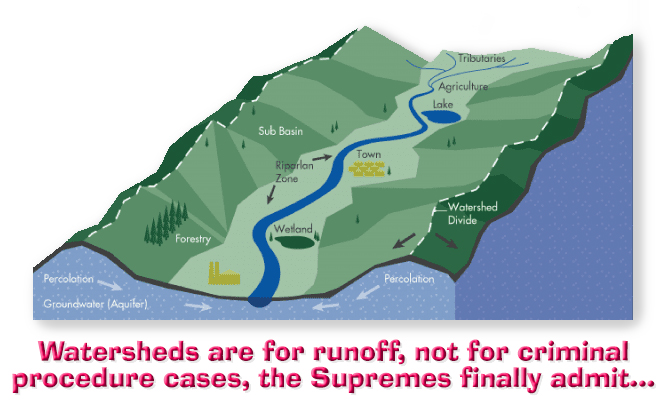We post news and comment on federal criminal justice issues, focused primarily on trial and post-conviction matters, legislative initiatives, and sentencing issues.

BAD (BUT UNSURPRISING) NEWS ON RETROACTIVITY
 How would you like to be convicted of a federal crime with a long sentence, only to have the Supreme Court hold well after the fact that something about your trial was unconstitutional? How would you like that?
How would you like to be convicted of a federal crime with a long sentence, only to have the Supreme Court hold well after the fact that something about your trial was unconstitutional? How would you like that?
That’s an easy one. You would not like to be convicted. Period. Whether it was done constitutionally or not. No one wants to be convicted. So that was a stupid question.
But over 50,000 people are convicted of federal crimes every year. And they don’t like it, either. They like it even less if, say, if the government grabbed your cellphone location data without a warrant, or you were convicted by a jury vote of 9-2, or the judge jacked up your statutory minimum because he thought your revolver was really a machine gun.
All of those were deemed to be unconstitutional. The cellphone location data? Carpenter v. United States, 2018. Less-than-unanimous jury? Ramos v. Louisiana, 2020. A nonjury finding jacking your mandatory minimum? Alleyne v. United States, 2013.
The problem is that if your conviction was final before these decisions established that you were constitutionally wronged, you have no right to ask the court for a do-over. That is not unless the decisions are declared to be retroactive, which means that cases like yours that are already final may reopen the issues on collateral review (habeas corpus).
 Thirty-two years ago, the Supreme Court explained in Teague v. Lane that decisions holding substantive criminal laws to be unconstitutional (such as the Armed Career Criminal Act residual clause in Johnson v. United States) are always retroactive to cases on § 2255 review. However, Teague held, a case in which a criminal procedure was declared unconstitutional (like searches in Carpenter or a less-than-unanimous jury in Ramos) is only retroactive on habeas review only if the new rule was “watershed,” “bedrock” or “essential.”
Thirty-two years ago, the Supreme Court explained in Teague v. Lane that decisions holding substantive criminal laws to be unconstitutional (such as the Armed Career Criminal Act residual clause in Johnson v. United States) are always retroactive to cases on § 2255 review. However, Teague held, a case in which a criminal procedure was declared unconstitutional (like searches in Carpenter or a less-than-unanimous jury in Ramos) is only retroactive on habeas review only if the new rule was “watershed,” “bedrock” or “essential.”
So what kind of ruling would be “watershed?” Prisoners and defense attorneys have looked for that elusive “watershed” decision for three decades without success. Last week, the Supreme Court heard a case asking whether last year’s Ramos rule on unanimous juries had to be unanimous (a holding which affected Louisiana and Oregon only) was retroactive. The Court ruled 6-3 that Ramos was not a “watershed” rule. More important, the Court gave up pretending that anything could ever be a “watershed” rule.
“This Court has repeatedly stated that a decision announcing a new rule of criminal procedure ordinarily does not apply retroactively on federal collateral review,” Justice Kavanaugh wrote for the majority. “Indeed, in the 32 years since Teague underscored that principle, this Court has announced many important new rules of criminal procedure. But the Court has not applied any of those new rules retroactively on federal collateral review… And for decades before Teague, the Court also regularly declined to apply new rules retroactively, including on federal collateral review… At this point, some 32 years after Teague, we think the only candid answer is that… no new rules of criminal procedure can satisfy the watershed exception. We cannot responsibly continue to suggest otherwise to litigants and courts… It is time — probably long past time — to make explicit what has become increasingly apparent to bench and bar over the last 32 years: New procedural rules do not apply retroactively on federal collateral review. The watershed exception is moribund.”
 So prisoners, at last, can give up trying to pound round constitutional procedure decisions into Teague’s square holes. The Supreme Court has said what a lot of us suspected ever since Apprendi was declared non-retroactive. Teague’s promise is now and always has been an illusion: there simply are no watershed decisions.
So prisoners, at last, can give up trying to pound round constitutional procedure decisions into Teague’s square holes. The Supreme Court has said what a lot of us suspected ever since Apprendi was declared non-retroactive. Teague’s promise is now and always has been an illusion: there simply are no watershed decisions.
Edwards v. Vannoy, Case No 19-5807, 2021 US LEXIS 2584 (May 17, 2021)
– Thomas L. Root

